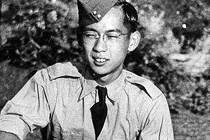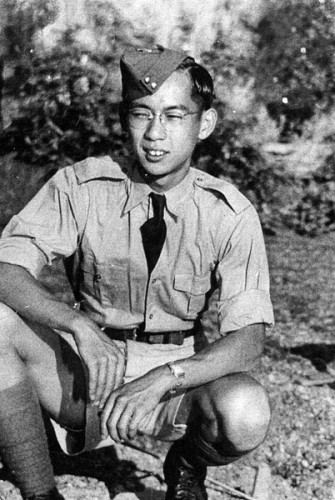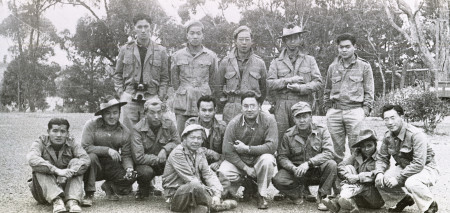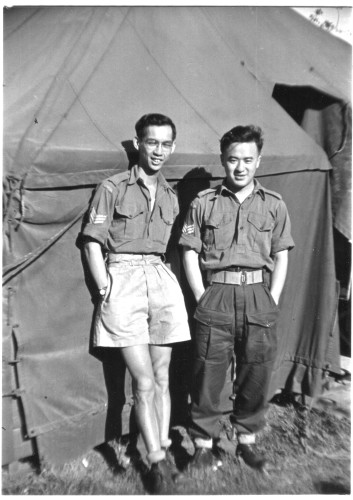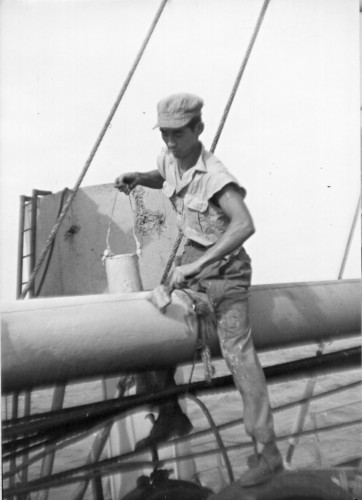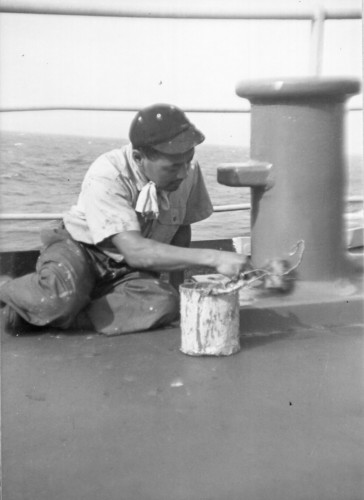Wong, who will turn 100 next year, is the last surviving member of Operation Oblivion, a covert military mission devised by the British secret service for 13 Chinese-Canadian volunteers during the Second World War.
Essentially, the plan — one that sounds like a Hollywood action movie — was for that hand-picked crew of 13 to be trained in guerrilla warfare and then dropped behind enemy lines into Japanese-occupied China.
Once in place, those soldiers were to connect with the Chinese resistance and subvert the Japanese by any means, including destroying communication towers, bridges and railway lines. It was considered a suicide mission. The men were issued cyanide capsules to be swallowed in the unlikely event they were taken alive.
Wong didn’t see the need for cyanide.
“If they captured you, you were dead anyhow,” says Wong, who moved from London into the Veterans Centre of Toronto’s Sunnybrook Health Sciences Centre this year.
An Omni Television documentary, Operation Oblivion, outlining the planned espionage and its historical significance, was released five years ago and it introduced many Canadians to the little-known 1944-45 spy story. The men were sworn to secrecy for 25 years but even after that only partial details emerged. Hence, Sandi Wong’s jolt of surprise when her father detailed his efficiency with explosives. And it was only when she and her dad sat down together to speak with the Star recently that she learned her father had done wartime surveillance with a mini camera.
“We were divorced from the Canadian army; it was all completely secret,” says Wong, who uses a walker, one of his few concessions to age.
“When I was recruited, even I didn’t know what it was for. They don’t tell you anything. You don’t have a name, you have a number.”
Before the war, Canada, particularly in British Columbia, was largely inhospitable to those of Chinese heritage. They weren’t recognized as citizens and they weren’t allowed to vote. The Chinese Immigration Act, also known as the Chinese Exclusion Act, along with a punitive head tax stemmed the flow of arrivals from China. Culturally too, those of Chinese heritage were barred from some jobs and public amenities such as swimming pools.
Some Chinese men in Canada believed serving in the war would earn them respect and eventually lead them to have full rights as citizens. The majority of the men volunteering for Operation Oblivion were from B.C.
Another of the Oblivion members was Victoria-born Douglas Jung, who went from having no legal status to becoming the first Chinese-Canadian elected as a member of Parliament. He was later Canada’s ambassador to the United Nations.
In an interview available on the Veterans Affairs Canada website, Jung — who died in 2002 — spoke to why Chinese-Canadians signed on to serve despite the lack of respect from their birth country.
“Some of us realized that unless we volunteered to serve Canada during this hour of need, we would be in a very difficult position after the war ended to demand our rights as Canadian citizens because the Canadian government would say to us, ‘What did you do during the war when everybody else was out fighting for Canada? What did you do?’ So a few of us volunteered to serve,” he said.
Someone like Wong, who was born in London, and spoke none of the Chinese languages, was not considered a Canadian national. When he and four buddies, all white, tried to join the navy in 1940, his friends were accepted but Wong was rejected because of his race. He then went downstairs to volunteer for the army and was offered a job as a steward in the officers mess.
Persistent, Wong travelled to Chatham and joined the Kent Regiment, only after the commanding officer there learned he’d studied auto mechanics in high school. Initially, he became that man’s personal driver. Relieved of that duty for speeding, he was trained as a weapon’s specialist and deployed with his unit at various locations on the B.C. coast, and in Halifax and Niagara Falls. When his sister’s husband died in 1944, Wong was granted compassionate leave to help her run her restaurant in Palmerston, Ont.
That’s where a rather straightforward soldier’s life took a dramatic twist. One day at the diner a mysterious stranger with a British accent ordered fish and chips and then lingered at his table waiting for the other customers to leave. Finally, he identified himself as representing British intelligence and he asked Wong if he was interested in returning to active duty. Wong was told to report to Wolseley Barracks (now part of CFB London). From there he was flown to the west coast where, after a week of waiting and still with no idea why he was there, he was ordered to the Vancouver Hotel for an interview.
Even though recruiters were surprised Wong spoke only English — he’d been raised mostly in a London orphanage — he was taken on to the special force because of his expertise as a weapons instructor.
Wong and the 12 other Asian men recruited by British Special Operations Executive were all anointed as sergeants — a rank, Wong says, “didn’t mean a damn thing” and wouldn’t draw attention — and began an odyssey that would first see them train clandestinely for five months on the shores of Okanagan Lake near Penticton, B.C. There, they lived in tents, practised rolling out of moving vehicles, learned hand-to-hand combat and did gun manoeuvres with live ammo.
In Wong’s case, he was also taught to speak Cantonese; some of the men learned how to swim. They were all then shipped to Melbourne, Australia, on a circuitous route that included a lengthy stop in New Guinea. Once down under, there was more intense commando instruction. Wong earned his paratrooper’s wings in Australia.
It was there, in 1945, where the operation was suddenly scrapped. American general Albert C. Wedemeyer had been given control of the Allied efforts in China. In the documentary, it is speculated that he had no interest in sharing glory for liberating the area.
While Wong and his small detachment awaited other deployment — five of the men did see action in Borneo — the Americans bombed Hiroshima and Nagasaki leading to the surrender of the Japanese. That left Wong’s crew in limbo. Because they were not officially Canadian soldiers — and weren’t expected to return alive — no plan was in place to get them home. They were abandoned in Australia.
“We just sat there,” Wong says. “Nobody owned us and we couldn’t get home. We had to work our way home on a freighter.”
When those men did get home, they faced another battle as Chinese-Canadians were still fighting for citizenship. The Chinese Exclusion Act was repealed in 1947 and they were given full rights.
Jung, in that online interview, said he believes that wartime sacrifice helped pave the way for this to happen. Several hundred Chinese-Canadians ultimately served.
“We’re very proud of that record and all this was done, bearing in mind, at a time when we did not have to serve Canada, but we thought in our guts that unless we did something like that, we could (not) show to the Canadian people, and to the Canadian government, that we were willing to work for everything that we wanted, which was no more than the rights of Canadian privileges, the rights that every other Canadian enjoys,” he said.
In 2006, then prime minister Stephen Harper apologized for the “the racist actions of our past” in regards to the head tax on Chinese-Canadian immigrants.
Because Operation Oblivion was a clandestine British initiative, it isn’t in the Canadian military records that Wong or the others participated in it. Sandi Wong says her dad didn’t receive some of the medals or recognition other Chinese-Canadians who served were awarded. She said she is going to try to rectify that through Veterans Affairs Canada this year.
After the war, Wong worked for General Steel Wares in London, as a heating and cooling lab technician. He then became an auditor for the steelworkers union.
Wong, in his understated way, now says doing all that training for a mission and then not seeing action is just how it goes in the service.
“In the army, you do what you’re told. You take what you get,” he says matter-of-factly. “We were all ready to go. Then it was no go. As soon as they dropped the atomic bomb, they didn’t want anything to do with us.”
— END–
